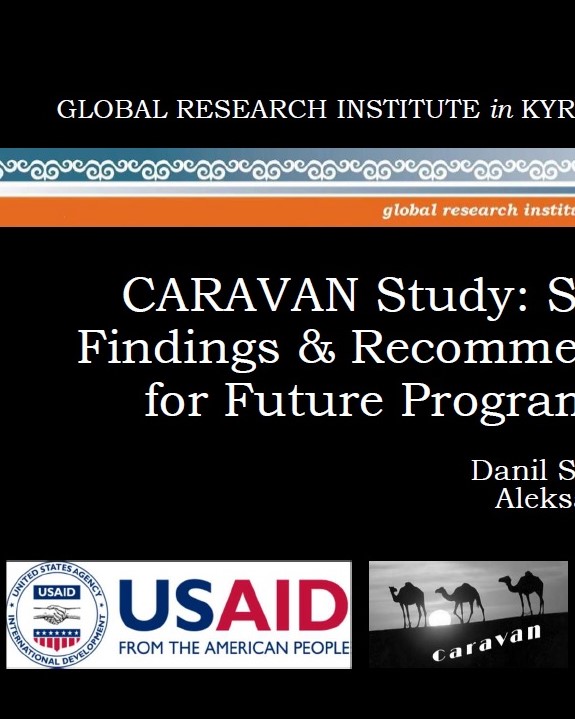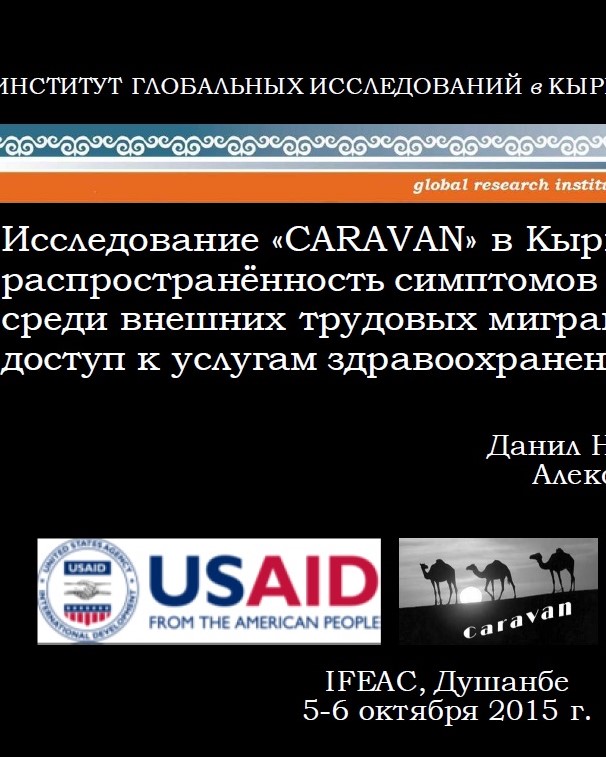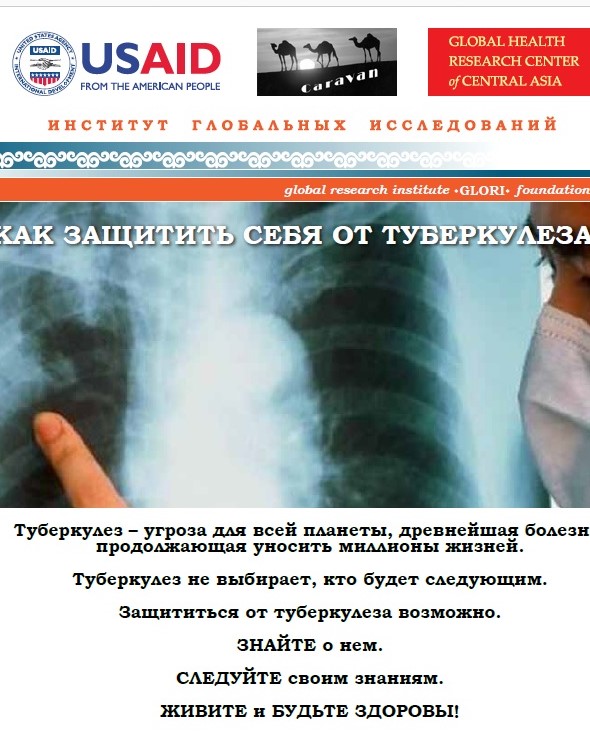 The CARAVAN study conducted by the Global Research Institute (GLORI) among external migrants in Kyrgyzstan, shows migrants’ neglect to their health issues while in the destination countries. Upon returning to their home country, they resume prioritizing health care and exploring government and private treatment options, thus spending significant amount of their savings at local health care facilities. The study identified low preparedness of the government health facilities and their staff, both in the home country and the destination countries, to service the applying migrants with consideration of their labor context, values, and cultural nuances, that causes migrants’ unwillingness to maintain sustainable communication with health professionals. The collected data demonstrate prevalence of stigmatization and discrimination towards migrants, both in the home and destination countries.
The CARAVAN study conducted by the Global Research Institute (GLORI) among external migrants in Kyrgyzstan, shows migrants’ neglect to their health issues while in the destination countries. Upon returning to their home country, they resume prioritizing health care and exploring government and private treatment options, thus spending significant amount of their savings at local health care facilities. The study identified low preparedness of the government health facilities and their staff, both in the home country and the destination countries, to service the applying migrants with consideration of their labor context, values, and cultural nuances, that causes migrants’ unwillingness to maintain sustainable communication with health professionals. The collected data demonstrate prevalence of stigmatization and discrimination towards migrants, both in the home and destination countries.
Study Performance Overview
The USAID-funded project CARAVAN examined self-reported prevalence and multilevel risk factors of Tuberculosis (TB) among returning labor migrants in Kyrgyzstan and other Central Asia countries, as well as assessed knowledge of TB and access to diagnostic and treatment services in this population. The Global Research Institute (GLORI) Foundation was primarily responsible for recruiting, consenting and surveying 420 subjects in the Kyrgyz towns of Osh and Kara-Balta and further referring them to appropriate services as stated in the study protocol.
Beginning February 28 through April 20, 2015, the GLORI’s staff visited a total of 1208 randomly selected households from the available address database and screened a total of 957. The number of migrants who lived in these households, was 679. The research team screened a total of 412 individuals for eligibility, 5 eligible migrants refused to participate, and 7 did not meet the study selection criteria that assumed them to be no younger than 18, to sufficiently communicate either in Russian, in Kyrgyz or in Uzbek, and travel for work outside Kyrgyzstan in the past 12 months and spend there no less than 3 months. As of April 20, 2015, there were 400 subjects consented and enrolled with whom the surveys were completed. The subjects’ age ranged from 18 through 65; however, respondents from 20 to 39 years old prevailed in the study sampling (71%, n=285). Most were males (63%, n=253). As of April 20, 63% of the 43 clients who got screened positive for one or more TB symptoms (n=27), demonstrated willingness to visit the TB clinic for further counseling. Of the ones committed to visit the doctor, 56% (n=15) did so. To support survey findings associated with stigma and access to services and to further investigate the hardships that migrants might experience in destination countries, from the sample of the 400 subjects GLORI staff recruited a sub-sample of 20 participants and interviewed them about their healthcare services utilization experience in home and destination countries. The mean in-depth interviewee’s age was 33 years.
Stigma & Discrimination
Stigma is a degrading and debasing attitude of the society that discredits a person or a group because of an attribute such as an illness, deformity, nationality, religion etc (retrieved from www.whocanyoutell.org). Since external labor migrants are constantly exposed to various risk and stigma factors and survive in stressful context, it was decided to explore their link to health services. The collected data show that it is a public clinic where most of the surveyed subjects use to apply for medical help in both destination country (60%, n=239) and in Kyrgyzstan (94%, n=377); the secondary choice would be a private clinic in destination country (44%, n=175) and a pharmacy in Kyrgyzstan (29%, n=117). There are 16 subjects (4%) who would prefer to not apply anywhere in case they experience a health issue in destination country. It is availability of work permit that is the key factor that correlates the subjects’ willingness to apply for medical help to a healthcare facility when they are in destination country. Most respondents (91%) of the 83 who went to a healthcare facility during their last stay in destination country in the past 12 months, confirmed that they received full information from the medical professional who worked with them, and only 3% remained dissatisfied. Of the 109 subjects who said that they went to a healthcare facility during last 12 months in Kyrgyzstan, none complained about the way the medical professional informed them of the specifics of their health issue.
Some of the surveyed subjects who received healthcare services during last 12 months, reported providing informal payment or giving presents to the medical staff who serviced them; the ones who received services in Kyrgyzstan, reported such cases more frequently (20 total) than the subjects who seek healthcare help in destination country (5 total). Although respondents reported almost identical amount spent when they last time contacted health facility ($153 in destination country and $154 in Kyrgyzstan), the amount spent for purchasing medication in Kyrgyzstan is significantly greater ($78 vs. $27 in destination country). There are 74% of respondents who identify healthcare services quality in destination country as excellent or good; unfortunately, this value reduces to 67% when the healthcare services in Kyrgyzstan are assessed. There were 4 subjects (1% of the 400 surveyed by GLORI) who applied for mental health services in the past 12 months; of the 396 remaining, there were 8 (2%) who reported need of mental health services but were unwilling to apply for them because they assumed that their friends and family would judge against them.
Self-stigma is the acceptance of prejudiced perceptions held by others; this can lead to a reluctance to seek treatment, excessive reliance on others, social withdrawal, and poor self-worth (retrieved from www.sane.org). Treating someone differently from how we treat others because of their mental health, whether consciously or subconsciously, is what is called discrimination (retrieved from www.time-tochange.org.uk). Several subjects (3%, n=10) suspect they would be discriminated by their friends and relatives if they had mental problems; 7% (n=27) also assume that would treat themselves differently if a doctor diagnoses them with a mental problem. Among the 400 migrants surveyed by GLORI, there were 5% (n=18) who reported their inability to receive health services in the last 12 months when they needed them in destination country. The number of respondents who didn’t receive health services in the last 12 months when they needed them in Kyrgyzstan, is 6 (1,5%) which is significantly less than the destination country value. The main reason why people were not able to receive the needed services, was (a) lack of money and high cost of the needed services, (b) refusal of doctors to treat them, (c) lack of time in destination country and big queues in Kyrgyzstan, and (d) fear of being deported while in destination country.
There were 7 cases (4 in destination country and 3 in Kyrgyzstan) when surveyed migrants were not hospitalized although hospitalization was recommended by a doctor. Three of the seven cases (1 in destination country and 2 in Kyrgyzstan) were associated with lack of money and high cost of the offered services. Besides, in two cases doctors in destination country refused to treat the surveyed subjects, in one case the subject didn’t find it would make sense to get hospitalized in destination country, and one subject was not able to get hospitalized in Kyrgyzstan because the clinic was missing the necessary equipment. In addition, there were 3 respondents (0,75%) who reported that they were not paid for their labor (0,25%) or that they worked for lodging and food (0,5%). Of other 397 respondents, 10% (n=41) reported that they didn’t receive full amount of previously discussed salary.
To support survey findings associated with stigma and access to services and to further investigate the limitations that migrants might be exposed to in destination countries, the research team conducted 20 in-depth anonymous interviews with migrants. 90% of the 20 respondents were Kyrgyz (n=18), the rest were of Uzbek, Uighur or Russian origin. 80% of interviewees (n=16) were married, 95% (n=19) worked in Russia and one in Kazakhstan. According to the interviewees, migrants who experience health problems abroad generally preferred not to turn for medical help. In many cases, this was because the migrants did not have registration, work permit, or medical insurance, i.e. the documents needed to check in at clinics in order to be eligible for treatment. Missing these documents created a barrier for migrants to access public health facilities. Another issue with public health facilities is that their office hours (09:00 to 18:00) do not fit the work schedules of migrants. Most migrants have no opportunity to leave their work during the daytime to make a doctor visit. Several migrants mentioned feeling uncomfortable going to public clinics in Russia as they feared discrimination as non-Russians. No concrete examples of discrimination were provided; however, interviewees’ overall impression was that in destination countries the community had negative attitude toward migrants. Migrants also feared losing their jobs if their employers learned that they were experiencing health problems. Many believed that companies would fire workers with health problems. As migrants spend significant time securing jobs, they place high value on avoiding problems once they have secured a position.
As an alternative to public clinics, migrants used private health facilities, consulted pharmacies staff or friends, or postponed treatment until they returned to Kyrgyzstan. The interviewees were satisfied with the treatment they received at private clinics; however, the cost of treatment was found to be a barrier to access. On average, private clinic treatment course cost a total of $300 with cost per single consultation ranging from $30 to $50. Migrants sought advice on medical treatment from pharmacy staff, friends and relatives. Unlike in Kyrgyzstan, they found that pharmacies in the destination countries were less willing to consult on medical care or provide medication for serious illnesses without a doctors’ prescription. In addition, migrants noted that advice from friends and relatives was not effective as they were generally not trained medical professionals. According to the interviewees, deferring medical treatment until they return to their home country was not quite feasible solution as delayed treatment worsened the health condition.
Recommendations
Considering the survey findings, the GLORI team recommends that the health- and TB-specific projects active in the country further secure public support by means of mass media engagement and orientation trainings with mass media reps. It seems important that the MoH / Government (a) keeps developing programs aimed at increasing public awareness of TB symptoms, TB-specific resources and available TB treatment approaches, and (b) comes up with a clear message about the service cost, making sure that the medical professionals follow the identified cost range and avoid accepting informal payments from the clients. While promoting public support to Out-of-Patient treatment philosophy, it makes sense that the TB-specific programs, both government and international, engage religious and faith-based organizations and collaboratively develop a culturally congruent treatment protocol / guidelines specified for fasting clients (e.g. Ramadan-observers) thus increasing quality of community dialogue.
The Government should be encouraged to invest funds in expanding the number of TB medical professionals in non-capital areas. HIV-servicing agencies should be encouraged to focus their educational and HIV-prevention activities on migrant population since almost 5% of the CARAVAN clients reported missing condom use while practicing sex with their non-regular and commercial partners. It seems feasible to use HIV-servicing agencies’ capacity, experience and best practices for developing clients’ retention and adherence to treatment. The in-depth interviews respondents suggested that a brochure would be helpful with clear instructions on what to do when migrants in destination counties (Russia and Kazakhstan) experience health care issues. They suggested including contacts of NGOs or relevant officers at the Embassies of the Kyrgyz Republic who would provide feasible advice on how and where to seek medical assistance. Finally, it was recommended that a study similar to CARAVAN be initiated in Kyrgyzstan to investigate health status and linkage to care in thousands of internal migrants who moved from rural areas to the cities of Osh and Bishkek and don’t have access to mainstream medical services available to the registered residents of the towns.
Download slides with CARAVAN overview and selected findings in English:




















